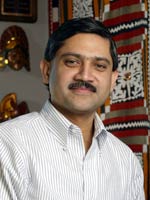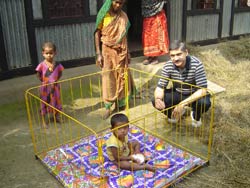A survey, a cave and a discovery: Guest Opinion by Adnan Hyder, M.D., Ph.D., M.P.H.
February 2010 | Volume 9, Issue 1

Photo courtesy of Dr. Adnan Hyder
Dr. Adnan Hyder
I trembled as I walked down the mountain - my usual controlled self could not contain the emotions sweeping my body - trembling limbs, breathing heavily, misty eyes all accompanied me for the next mile as I hiked back to our camp. I had just administered a health and demographic survey to a family of eight living in a cave on a mountain in Northern Pakistan. The year was 1986, not 1786 or 1886, but in the 20th century when people in the same country were living in glorious estates, farmhouses, residences, apartments, and even huts - but not caves. Caves? I would not have believed and could not: a father barely able to feed his children; a mother who had been pregnant 12 times and had already lost six of her children; and six malnourished children who ran around the mountain barely clothed. Disgust at this lack of responsibility by the state; outrage at the injustice suffered by this family; deep shame at the thought of how my life compared with theirs - all these things raged through my mind.

Photo courtesy of Dr. Adnan Hyder
Dr. Hyder’s interest in public health began
during a 1986 visit to impoverished people in
Northern Pakistan while he was a physician-in-training.
I was a young physician-in-training in Karachi, Pakistan, and this experience has remained with me for the past 23 years, as if I was there yesterday. A defining moment that forever captured me with that eternal question of inquiry - why? Why does the government allow this? Why does society allow fellow human beings to suffer so much? Why does the health sector ignore these people? And thus started the two streams of influence in my professional career: a concern for the health of populations; and a process of inquiry. This truly was the start of my search for a career that builds on my medical knowledge and yet focuses on where diseases originate; that looks at symptoms but seeks the source of ill health; and that considers not only individuals but their relationships and context. Public health answered the call for me - and the path of knowledge and discovery within the reality of human life opens each day as I work.
Most importantly this has made me realize the importance of developing the capacity of those interested in pursuing the same path, of making sure that others who seek their calling in public health get a warm response. That is why education and training are a core aspect of all my projects: helping colleagues do research; assisting them as they write their results; and supporting their careers, especially in the developing world. And yet what some of them do not understand is that I learn more from them; each interaction is a case study - some more technical and others more managerial, but all fascinating.
Dr. Adnan Hyder, a current Fogarty grantee, is an international health professor at Johns Hopkins University, as well as director of its International Injury Research Unit. This essay originally appeared in the Johns Hopkins Public Health magazine.
To view Adobe PDF files,
download current, free accessible plug-ins from Adobe's website.
Related World Regions / Countries